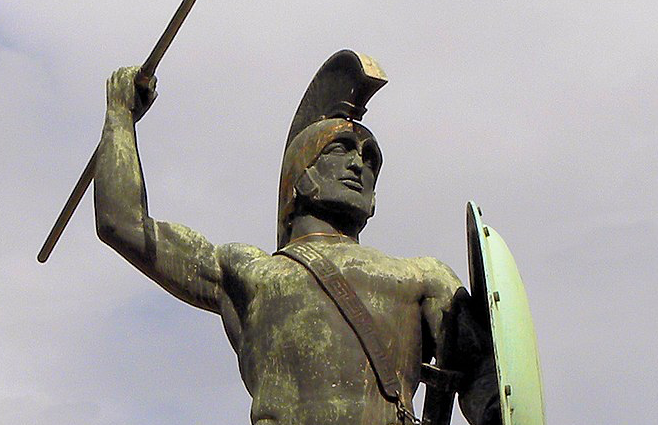“Molon labe” (μολὼν λαβέ). Literally, “Come and take (them)”. This was the message sent by Leonidas, King of Sparta, to the Persian king Xerxes, when Xerxes demanded that the Greeks lay down their arms.

The battle of Thermopylae was the first between the Persians and Greeks during the Persian invasion of 480-479 BC. The Greek force was very small but was determined to make a stand against the huge Persian army.
All of Greece was in fear, knowing that the army of the Persian king Xerxes had begun its invasion of Greece. Already the Thessalians had gone over to the Persian side, but some Greek cities had come together and forgotten their usual rivalries, determining to stop the Persian invasion. These cities agreed that Sparta would lead the Greek army, as her reputation in war was unmatched by any other Greek state.
The Greeks had chosen to defend a narrow pass, or gap, between the mountains of central Greece and the sea, called Thermopylae. This pass was part of the route into Greece from the north. Here the Greek force now waited, made up of only 300 Spartans under their king, Leonidas, and about 6000 soldiers from other Greek cities. They faced a Persian army of perhaps 100,000 men.
After the Persians arrived at the pass, several days crept by without battle beginning. Xerxes sent a scout to find out what the Greek position was. The scout returned to the king, who was amazed by what he heard. In front of a wall that blocked the pass the 300 Spartans were combing their hair and exercising. However, the king was warned not to misread this information: the Spartans were preparing to fight to the death and were men of great bravery.
Finally, after the nerve-wracking wait, the Persians launched their attack. The Greeks were defending the pass from behind the wall that blocked the path. They took it in turns to hold the front line and fought off wave after wave of attacking Persians. In the narrow space, the Persians could not make use of their greater numbers and the longer spears of the Greeks meant that they inflicted many casualties on the Persians.
The Spartans also used a clever strategy to further overwhelm their enemy. They pretended to retreat so that the Persians chased after them, but would then turn upon the Persians and in the confusion kill many of the enemy.
In this way two days of battle passed, with the Persians unable to defeat the much smaller army of Greeks. The Persians had lost many men, but their luck was about to change. A Greek traitor came to the Persian king with information of huge importance.
Above the pass of Thermopylae was another path that was known to local people only. It would allow the Persians to come secretly through the mountains and round behind the Greek army guarding the pass below. The Greeks would then be trapped with the Persians in front of and behind them.
As darkness fell, the Persian king sent his best soldiers to take the secret path and so come up behind the Greeks. At dawn on the third day of battle, the Greeks discovered that they had been betrayed. Leonidas, the Spartan leader, chose to fight to the end, knowing that his men could never win this battle. He told the remaining Greek soldiers to flee whilst they could, but the Spartans would show their courage and fight on.
The Spartans withdrew to a hillock near the pass, together with a few other Greek soldiers who had refused to leave. They fought the Persians with all their remaining strength. When their weapons broke, they fought with their hands and teeth. But the Persian soldiers vastly outnumbered them and finally the Spartans were overwhelmed with a volley of arrows fired by the Persians.
And so the Spartans and those other Greeks who fought to the death had lost the battle for Thermopylae. The Persian army could now march into central Greece, wreaking havoc and destruction. But, although the Greeks had lost this battle, the great courage shown by the Spartans boosted the morale of other Greeks. They were not ready just yet to surrender to the Persians.
(Source: http://www.ancientgreece.co.uk/war/story/sto_set.html)



